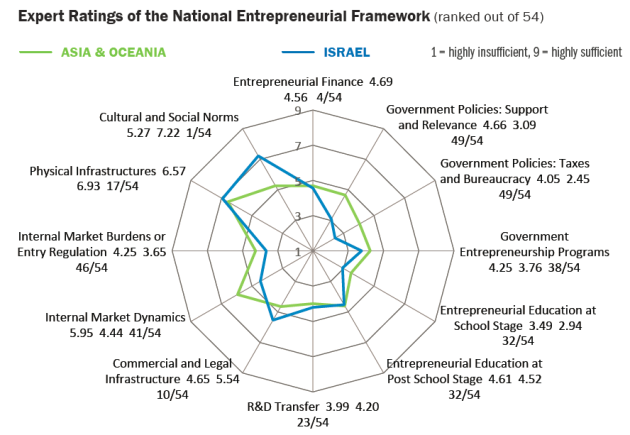by Shlomo Maital

Source: Global Entrepreneurship Monitor, 2017-18.
Israel is the startup nation. According to the Global Entrepreneurship Monitor, which annually surveys 65 nations, Israel ranks #1 out of 65 advanced countries in the “cultural and social norms” that drive entrepreneurship, ahead of the United States and Estonia. Fully one-third of Israelis intend to start a business within the coming three years. This is probably the highest in the world.
Another survey by the S. Neaman Institute reveals that one Technion graduate in four launches a startup; and one female graduate in every seven. Young Israelis, and not-so-young ones, have an enormous inner drive to launch startups, despite the risk — more than in any other country. In 2016 there were 4,362 active startups, not including ‘pre-seed’ (i.e. those without even initial funding). This is an enormous valuable national treasure.
Yet at the same time, we know for certain that the vast majority of those new businesses will not survive the first 42 months. According to the Israel Venture Center together with ReversExit, 96 per cent of all 10,000 startups founded between 1997 and 2014 did not succeed – either they failed, or remained dormant.
And there are signs startup nation is running out of gas. According to the Central Statistical Bureau, during 2014-16 the gap between new startups born and old startups closing fell sharply, by 29% yearly – this, after this birth/death ratio rose 12% yearly in 2011-13. The reason? Mainly, relatively fewer startups are being born.
What this means is — Israel has a powerful culture of entrepreneurship, but has not given its bold young entrepreneurs the tools and ecosystem they need to succeed. We are cheating our young people. We built a culture of bold startups. And at the same time, a culture of חרטא – of disorganized confusion. We celebrate failure, rather than try to deal with it.
Why do the vast majority of startups fail? What is lacking?
* Entrepreneurship education in high schools and universities and colleges is inadequate, ranking Israel only 32nd out of 54 countries (according to GEM). Our study of Technion graduates who launch startups found that half had no courses or activities during their university studies that gave them business skills.
* Government: bureaucracy, taxes, support, all are poor, ranking Israel between 38th and 49th out of 54 nations, near the bottom.
* Israel’s internal market is far from supportive for startups, ranking Israel between 41st and 46th out of 54 countries. It is true, nearly all startups must be ‘global’ from Day One and aim to export – but a competitive, open dynamic home market would give startups a chance to sharpen their knives before trying to compete globally. Israel’s economy is dominated by monopolies.
Is it morally right to build a culture that drives entrepreneurship, without giving entrepreneurs the key tools and ecosystem they need to have a minimal chance to succeed? Is a 96% failure rate truly necessary? We preach that failure is noble, that failure should be celebrated as well as success – but is this appropriate? The astronomical failure rate of startups should drive some deep soul searching — why do most startups fail? What can be done about it to improve the odds? Above all, it must be understood, 96% failure is not baked into the cake.
Israel is not only a Startup Nation, it is also Failure Nation. Government, academe and business must put their heads together to tackle the problem. Otherwise, we are cheating and deceiving our bold entrepreneurs.
Expert Ratings of the National Entrepreneurial Framework (out of 54 countries)
Variable Rank Score
Cultural and Social Norms #1 / 54 7.22/9
Entrepreneurial Finance #4 5.5
Govt. Polices (support & relevance) #49 3.09
Govt. Polices (taxes, bureaucracy) #49 2.45
Govt. Entrepreneurship Programs #38 3.76
Entrepreneurial Education (schools) #32 2.94
Entrepreneurial Education (univ.) #32 4.54
R&D Transfer #23 4.20
Commercial, legal infrastructure #10 5.54
Internal market dynamics #41 4.44
Internal Market Burdens, Entry Reg. #46 3.65
Physical Infrastructures #17 6.93
Source: Global Entrepreneurship Monitor, 2017/18 Report, p. 69

